On September 25, Iraqi Kurds will hold a non-binding referendum on independence. The autonomous Kurdish Regional Government (KRG) has the capacity to hold the vote over the objections of the Iraqi government. Most likely, the vote will overwhelmingly favor independence and secession.
Why are they pushing for this now, and what can we expect next? Domestic politics, within the Kurdish autonomous region and within Iraq, drive the timing for the referendum. The polling results would be used most constructively to strengthen Iraqi Kurdish positions in a new, post-ISIS reconsideration of outstanding constitutional questions.
The backstory
Kurds are a distinct ethnicity from the Iraq’s Arab majority, and are dispersed as minorities in contiguous territory in Iraq, Iran, Syria, and Turkey. Within Iraq, Kurds and Arabs have had a longstanding conflict, punctuated by mass violence, over the demographic and jurisdictional control of Kurdish areas. Kurds have maintained an autonomous zone in northern Iraq since 1991, first under the international no-fly zone and then, following the U.S. invasion and the 2005 Iraqi constitution, under a federal arrangement. In exchange for agreeing to the unitary state of Iraq, Kurds gained constitutional recognition of their autonomy and claims to disputed territories. Iraqi Kurds’ struggle for autonomy takes place alongside broader aspirations for independence. Similarly, assertions of the right to self-determination for Kurds have been used to strengthen Kurdish territorial claims within the framework of a unified Iraq.
In January 2005, Iraqi Kurds held a similar referendum on independence. Like this month’s vote, the 2005 poll was unofficial. The KRG organized and administered the polling independent of Iraq’s electoral commission. Some polling was carried out within disputed territories, including in Kirkuk and Mosul. Ninety-nine percent of the two million voters were in favor of independence.
Secessionist, unilateral referendums are common around the world today. The votes take place without the support of the central state, which calls them illegal. Unilateral referendums are not held to make changes to the status quo—rather, they’re aspirational. Separatists around the world have held an increasing number of these votes over the last 25 years, including votes in South Ossetia, Abkhazia, Transneistria, Gagauzia, Nagorno-Karabakh, Somaliland, Tamil-Eelam, and Catalonia. The broad conclusion to be drawn from these votes is that they have symbolic internal meaning but relatively little impact on materially advancing independence.
And yet, these referendums can be a form of “soft” state building. Symbolic votes for independence may function as part of mass mobilization to bolster internal legitimacy. This type of symbolic mobilization takes place in moments of regime weakness and vulnerability for separatist leaders and governments.
Politics, politics
So why have the Iraqi Kurds chosen this moment for the referendum?
The domestic politics of the KRG may be the primary driver of the timing of the referendum. The KRG government has gone through a prolonged crisis of legitimacy. The KRG’s parliament was elected in 2013, but has not met in close to two years. The president of the regional government, Masoud Barzani, was re-elected in 2009, and his mandate expired in 2013. His presidential term has been extended twice, but that period expired in 2015. The regional legislature has not met since October 2015. Barzani and his party are criticized as increasingly authoritarian. Since 2015, the KRG has also suffered an economic crisis.
Barzani leads the largest Kurdish party, the Kurdistan Democratic Party (KDP), which has been a longstanding rival as well as collaborator with the Patriotic Union of Kurdistan (PUK). The dominance of those two parties was interrupted by the rise of the Gorran party in 2009 (Movement for Change), which had an anti-corruption platform and a young, urban, liberal constituency. Gorran is now the second largest party in the Kurdistan parliament.
Following the 2013 elections, the KDP formed an alliance with Gorran rather than the PUK. In 2015 however, that alliance was broken in spectacular fashion when Gorran sought to change the law on presidential authority. Barzani ended the Gorran-KDP coalition. In October 2015, the KDP came under attack by rioters in Sulaymaniyah. Five people were killed. The KDP erroneously blamed Gorran and blocked the party leader and five ministers from the KRG’s capital city, Erbil. This series of events brought about an alliance between Gorran and the PUK, which had the potential to overturn the KDP’s dominant hold on the parliament and presidency of the KRG.
Presidential and parliamentary elections in Kurdistan are set to be held on November 1. Campaigning for the referendum has had a dramatic impact on the political discussion within the KRG. Although independence is overwhelmingly popular, there are nuanced positions among the political parties. The KDP has been increasingly assertive in its rhetoric for either seceding from Iraq or gaining further rights and deepening autonomy. Its policy of independently negotiating oil exports, for example, led Baghdad to cut off funds to the KRG in 2014. Gorran has argued for a less confrontational, more cooperative approach to Baghdad. However, the support for the September 25 polls has shut down nuanced discussions. The popularity of the referendum is likely to deliver an electoral bump to the KDP. The timing of the referendum seems politically motivated.
The timing of the referendum seems politically motivated.
Relations between Erbil and Baghdad are another potential driver of the timing of the referendum. Iraqi Kurds have several inter-related, existential issues to negotiate with Baghdad, including a proposed confederation, revenue sharing, the status of security forces, and contested jurisdiction over a swath of disputed territories. The 2005 constitution left most of these issues either unsettled or to be settled through mechanisms that have been impossible to implement: namely the Article 140 constitutional mandate. That article legalized “normalization,” returning internally displaced Kurds to the disputed territories, followed by a census and referendum on whether those areas should join the autonomous region. The process was to have been completed in two years, but was never implemented. Despite efforts to amend the constitution to address these questions, negotiations were unproductive and relations between the KRG and the central government worsened.
In 2014, the Iraqi Kurdish Peshmerga security forces defended areas abandoned by Iraqi security forces and have expanded their territorial holds in disputed territories. In a post-ISIS Iraq, Iraqis will have to sort out who has rights to liberated areas. A mix of Peshmerga, Iraqi security forces, and Shiite militias have already begun to dig in to territory they now control. In re-asserting state control after ISIS, there will be impetus to advance Kurdish territorial demands short of independence.
If participation in the referendum is high throughout the disputed territories, that will be an indication of the strength of the Kurdish claims. The Provincial Council of Kirkuk voted to participate, and last week the Iraqi parliament voted to remove Kirkuk’s governor from office in response. The KRG may use the referendum to assert claims to disputed territories that it now occupies in connection to the fight against ISIS. As the January 2005 endorsement of independence was useful for the Kurds in negotiating the constitution, this vote may be helpful in these future negotiations.
The global objections to the referendum may also prove useful in this context. Western allies and regional powers have called the referendum a mistake and are meeting with Barzani to try to convince him to call off the vote. Reportedly, the United States, U.K., and U.N. presented Barzani with an “alternative” to the referendum. Such an alternative might be international support to new negotiations with Baghdad.
Despite international condemnation of the vote itself, the simple potential of the referendum has brought attention to a surprising array of supporters for the independence of the Iraqi Kurds. There have been pro-independence pieces in U.S. media. Israeli Prime Minister Netanyahu made public statements in support of the vote and of independence. Saudi Arabia has refrained from making a public statement, but offered to mediate between Erbil and Baghdad. There is a Twitter campaign of pro-referendum Saudis expressing support. These neighboring states are exploiting the referendum in the regional power struggles between Israel and Arabs and Sunnis and Shia. International public discussion of Kurdish rights to self-determination will advance their cause whether it is within Iraq or independent of it.
A “yes” vote? Then what?
What’s next? Absent an unexpected change of plans to hold the referendum, the vote will most likely be held, within the KRG and in some of the disputed territories. As in 2005, turnout is likely to be high and support for the proposition will be overwhelming. Independence supporters appear galvanized.
Following the vote, there are limited options for using the results to continue the push for independence. A unilateral declaration of independence is unlikely and would be dangerous. More likely, as in most unilateral secessionist referendums and as in Kurdistan’s 2005 poll, the results will be a strategic marker, useful for the KDP within Kurdistan and useful for pushing Kurdish claims vis-à-vis Baghdad.
Iraqi Kurds may want independence. But the best outcome for the vote on independence is new negotiations on the unified state. Since 2005, Baghdad has failed to address questions on KRG rights to exploit oil in its territories, the status of integrated security forces units, and a process through which the status of the disputed territories might be decided. The 2005 constitutional arrangements needed to be supple in order to take care of these outstanding issues and provide politics that could handle future contestation. Instead the constitution is brittle. It is not working on many levels and has become a source of contestation. The process of addressing these problems, though, may put the unified state at risk. This referendum can be used by the KRG to press Iraq to deal with outstanding constitutional issues and has already been useful for building international support to that process. If negotiations are unproductive, the referendum is also a move toward independence based on continued failures of the central Iraqi state to accommodate the autonomous Kurds.



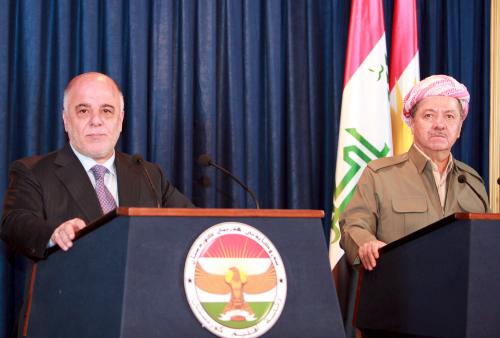
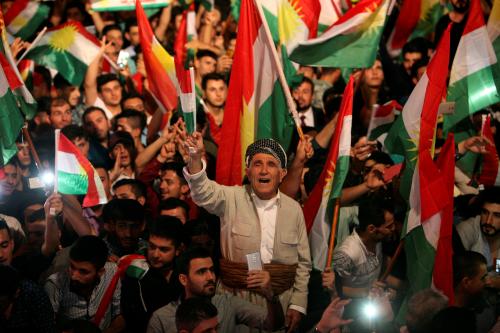


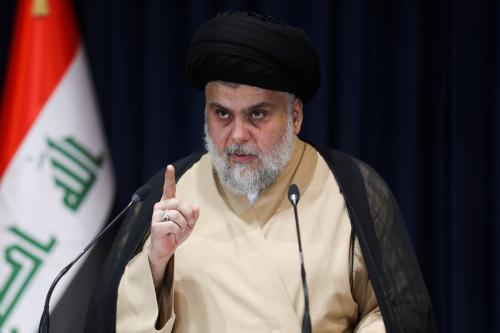
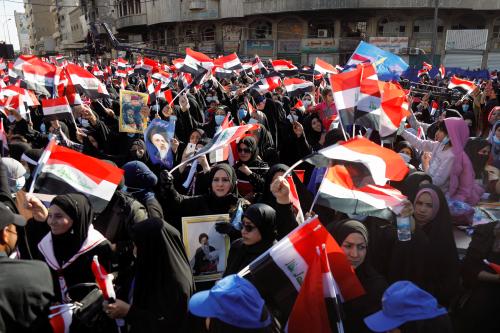
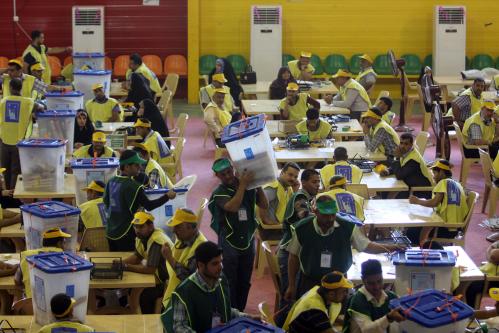
Commentary
The Kurdish referendum won’t deliver independence—here’s why it matters anyway
September 19, 2017